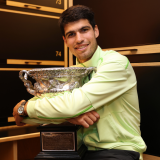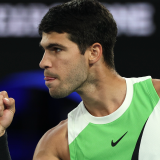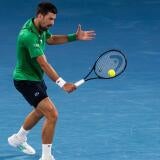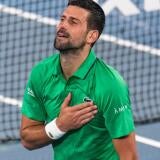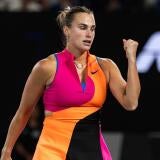Chris Evert holds court on Serena's biggest challenge and why the G.O.A.T debate is tired
The tennis legend talks about the gender pay gap, how being a mom shifts priorities and who she likes at Wimbledon
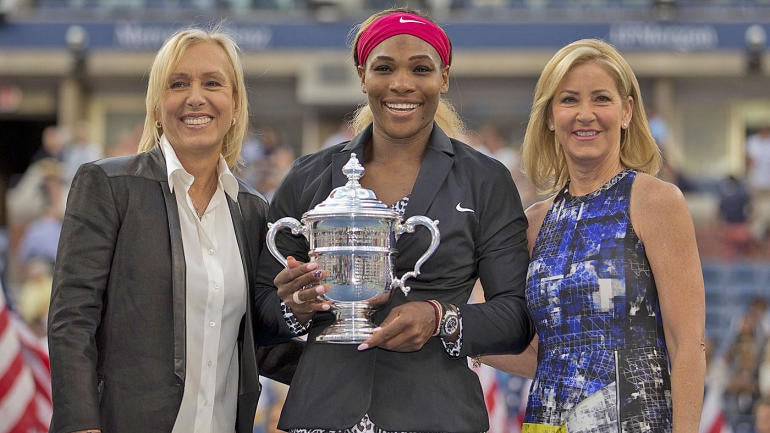
Chris Evert has one word for the debate over who is the greatest women's tennis player of all-time.
Ridiculous.
"I think it's apples and oranges," said Evert, on the phone from her Aspen, Colo., home where she spends her summers. "The one thing you can say is that Serena [Williams} is the best tennis player that we've seen, but up until my era and Martina [Navratilova's] era, Steffi [Graf's] era, that was true as well. The standards get higher and higher."
To make her point, Evert offered up that female swimmers have since eclipsed some of the world records once held by the great Mark Spitz. Evert certainly has a case for the G.O.A.T debate, still owning the best winning percentage, male or female, in tennis history to go with her 18 Grand Slam titles. She'd certainly have more, too, if not for her longtime rival and close friend Navratilova, with whom she waged war for the No. 1 ranking and major titles in 80 meetings -- 60 of them in finals -- over 16 years, starting with their first match in 1973. Navratilova won 43 of those 80 meetings and claimed 18 Grand Slams of her own, placing her and Evert in a tie for fourth behind Margaret Court (24), Serena Williams (23) and Steffi Graf (22).
Still, doesn't matter. At least not to Evert.
"Of course Serena is the best ever," she said. "A case can be made, but it's really ridiculous. We were the best in our era. Serena is the best in her era."
Evert said her passion for the game she and Navratilova once dominated hasn't waned, but it stopped being her top priority after she became a mother. If she and Navratilova took to the court to square off today, possibly in Aspen -- where Navratilova has been a part-time resident and has played a few shifts for the local women's hockey team, the Mother Puckers, in years past -- Evert said Navratilova wins.
"She doesn't have three kids," Evert joked. "I think for her, she's still in good shape, body-wise and tennis-wise. She still plays exhibitions, legends events. She's never really stopped."
But Evert, who recently became a spokesperson for Osteo Bi-Flex, a joint health supplement, has hardly slowed down.
She had been rock climbing with one of her sons earlier in the day, and said she still loves to hike, practice yoga and hit balls on the tennis court, among other things. She's focused on moving forward, not looking back.
"I think all those years on the hard court, I do feel the aches and pains," said. "I feel like it gives me a little edge with my joint flexibility and movement, and I'm always encouraging movement. Get out there and move, no matter whatever age you are. You can still exercise."
While it's assumed that Williams, sitting on 23 Grand Slams, will eclipse Court, Evert said that nothing is set in stone, especially now that Williams is a new mother with a new set of priorities.
"It's not only that she's had a break, but she has a child now. I'm sorry, but being a mom, she's in a different emotional place than she has ever been in her life," said Evert, who has three boys. "Can she compartmentalize all of that and be almost robotic? Will she regain that focus that she's famous for? It's understandable. You soften your edges. That's gonna be the big challenge."

Evert said that Williams, who retired from this year's French Open citing a pectoral injury before an anticipated quarterfinal showdown with rival Maria Sharapova, can certainly get back on top. But the biggest challenge will be "the emotional and mental part."
"The climate in the women's game is so different than 2-3 years ago, when Serena was dominating," Evert said. "One of like 12 women on a given day can win a Grand Slam. We haven't seen Serena's best yet. She's at 50-60 percent, and you just kind of wonder how long it will take. That's the question: Can she get her game up to 80 or 90 percent? Will she be able to do that at Wimbledon, which is her best surface, and best accentuates all of her weapons."
It's the obvious question as the third Grand Slam of 2018 approaches in early July, with Williams a favorite despite her recent injury and her return from tennis after a 14-month break following a difficult pregnancy.
If Serena's playing, she's the clear favorite. But Evert said the unpredictability at the top of the women's game right now is what makes it so compelling -- yet at the same time frustrating.
"It's once every 20-30 years that someone can come along and dominate," she said. "Serena was it the last 20 years. Like I said, on any day, one of 12 women can be the different winner in Grand Slams. For me, it's a little disappointing that no one steps up to the plate. Someone wins a Grand Slam and then they go away for six months. We haven't seen anybody with the passion and the hunger to win that Serena has."
When Serena Williams does decide to call it a career, Evert doesn't see any of the current players on the circuit with a Grand Slam to their name -- Simona Halep, Garbine Muguruza and American Sloane Stephens among them -- ready to step in and be the next greatest player of her era.
"I don't think the field nowadays feels that hunger," she added. "Maybe someone will come along and feel that way. We've got a lot of talent, but nobody with that passion."
That said, Evert strongly disagrees with Rafael Nadal's comments that the top female tennis players shouldn't make as much as their male counterparts because they don't draw the same TV ratings. She also said it was "pathetic" that not a single woman cracked Forbes' most recent annual list of the 100 highest-paid athletes, with Serena Williams just missing the cut.
"I was shocked," she said. "It just shows you how behind the times we are, even though we've made progress."


